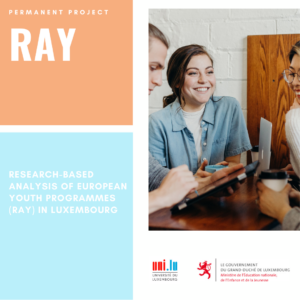The European Union promotes young people’s mobility since a lot of years by specific programmes. In the area of non-formal activities, the Youth in Action programme supports individual mobility activities as well as group mobility of young persons and youth workers. Although the programme is very successful, there existed not much knowledge about the effects of the projects on participants and project leaders. Therefore, in 2008 a small group of countries founded the RAY network – ‘Research-based analysis and monitoring of Youth in action’ – which has expanded since then and comprises today 31 countries. Its goal is to permanently gather and analyse data on the processes and outcomes of the YiA programme and its successor programme.
Luxembourg joined the RAY network in 2010 and participated from 2011 to 2014 in 6 surveys in the framework of the YiA programme. During this time about 589 project participants and 252 project leaders answered the online questionnaires, which were sent to them some time after the end of the activity. In addition to the quantitative survey, a qualitative study on the effects of non-formal learning in the projects was realised in 2012/2013. In my presentation I want to show some of the results found in Luxembourg. Among other things, I will present a factor analysis on the competences, skills and attitudes developed by the participants and show how different project types can influence these effects.



